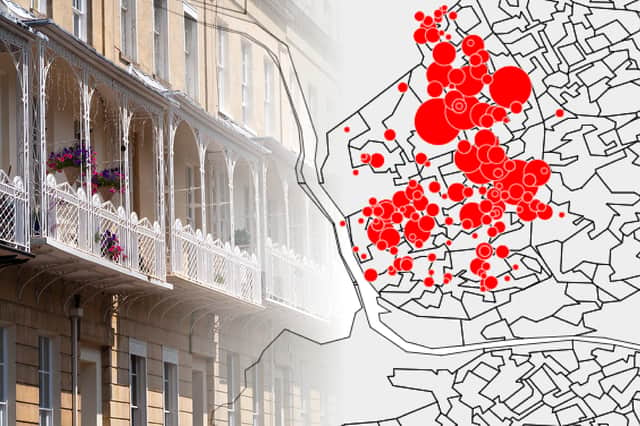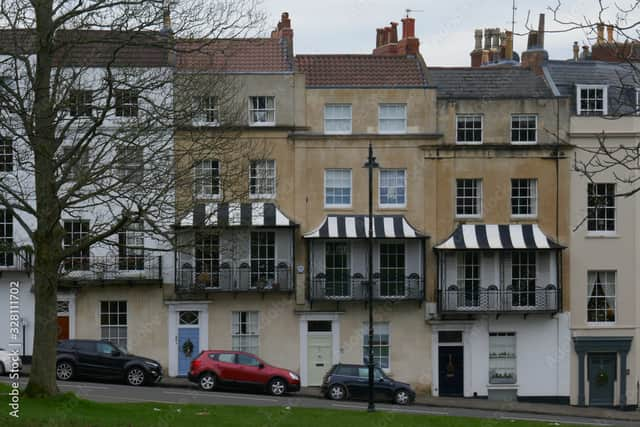The Bristol area with one of the highest concentration of HMOs - what’s the impact?


With the housing crisis across the UK causing more and more people to move into shared accommodation, we looked at just how many houses of multiple occupation (HMOs) there are across Bristol.
One area with one of the highest numbers was Clifton - and today we report on the impact with people concerned over an imbalance in communities and rising problems with waste and noise management as family homes are removed from the housing stock.
Advertisement
Hide AdAdvertisement
Hide AdA Freedom of Information Act request to Bristol City Council revealed the number of fully licensed registered HMOs by street for this month - including Clifton:
Loading....
Clifton has one of the highest numbers of HMOs in Bristol, with some of the most concentrated streets of multiple occupancy housing. There are two main drivers for the proliferation of HMOs, one of those being the university expansion (over 50% in the last 10 years alone) and one of those being the exploding rents in Bristol.
They are a necessary part of the housing mix, providing cheaper housing for those who need it and a more transient nature of living, but the high amount per street is causing issues with community development, poor standard of living and lack of family housing.
146 streets show to have HMOs on them in Clifton, with many having above 20 per street. Some of the most highly concentrated roads include Pembroke Road with 59, Queens Road with 55, Whiteladies Road with 48, Alma Vale Road with 36, and Arlington Villas with 33.
Advertisement
Hide AdAdvertisement
Hide AdIt also shows St Johns Road with 25, St Pauls Road with 24, both Beaufort Road and Eaton Crescent have 21, and Princess Victoria Street has 20, amongst many other highly concentrated streets.


The HMO supplementary planning document (SPD) that was adopted in November 2020 sets a definition of what a higher number of HMOs is in a community. It states that more than 10% of residential properties being HMOs is a harmful concentration.
The council has, therefore, recognised that the over-proliferation of HMOs is a problem. Despite this, the likelihood is, however, that there are many, many more than we know about.
“We don’t have enough planning enforcement resources,” explains Caroline Dix, of Action for Balanced Communities. “We don’t have enough people who are able to seek to enforce the regulations and planning requirements around HMOs and that’s causing some problems. “
Advertisement
Hide AdAdvertisement
Hide AdSo, what do local residents and people in the community feel about the high concentration of HMOs within Clifton? We talked to a few people about their thoughts and discovered some of the main problems arising.
COMMUNITY
One of the biggest issues arising from too many HMOs within one area is the lack of community it encourages, through the transient nature of people moving in and out of a property.


“There’s a potential for less community building because tenants move in and out more frequently,” says Councillor Tom Hathway, green councillor for Clifton Down.
“Statistics for our ward show that we have a consistently younger demographic in our area, so the loss of family housing from being converted into HMOs is a negative because it doesn’t give a balanced community with people from all walks of life.”
Advertisement
Hide AdAdvertisement
Hide AdHaving spoken to various residents and members of community groups such as the Oakfield Residents Association, it’s clear that everyone wants to live in a nice, successful community, even if they don’t want to proactively take part in it.
“A high level of HMOs takes away that ability for us to create a successful community. The difficulty is it creates a high level of transience,” says Ms Dix.
“You have people that aren’t bought in, aren’t embedded, and don’t have the drive to do things to be part of a community and make a community better. Because of the ways landlords operate, HMOs are really high occupancy so there is a high concentration of transience in certain places.”
NOISE
This leads to people not being as invested in an area, and therefore not as interested in keeping the noise down.
Advertisement
Hide AdAdvertisement
Hide Ad“There is also the problem of intensification of noise within a house,” says Councillor Hathway. “If there was once a family living there and there are now eight people in one house, the noise is a lot more.
“A lot of HMOs in our area still have single glazing, sash windows and old wooden doors that don’t mitigate sound. These are all things in landlords’ capacity to change, but maximizing rent is more important.”
WASTE AND MAINTENANCE
“Clearly, HMOs produce more bins and recycling boxes as they are needed to service more people in a property, so there are waste issues,” says Councillor Hathway.
“The responsibility for looking after them can diffuse amongst tenants without one person taking responsibility for the rubbish.”
Advertisement
Hide AdAdvertisement
Hide Ad

This idea of properties not being maintained and streets becoming scruffy is one of the main complaints from residents within Clifton. A lot of the time, the landlord of the property doesn’t have an invested interest in keeping the area clean and tidy.
“A lot of the HMOs are poorly designed, too, so they don’t have space in their gardens for enough bike and bin stores,” continues Councillor Hathway.
STEREOTYPES AND DIVISIVENESS
Unfortunately, the desperate need for more affordable housing means that more and more people are in HMOs than ever before - and for longer into their adult lives, too. One big issue that comes from this is the resulting divisiveness and stereotyping.
But as Susannah Peacock, a local resident says, it’s important not to place blame on young people, or on those within HMOs. She’s passionate about showcasing that young people are hardworking, an integral part of the city and in need of support.
Advertisement
Hide AdAdvertisement
Hide Ad

“The price for a shared room in central Bristol is achieving £750/month! When young people are earning the same as we did 25 years ago, this is horrendous,” she says.
“I live in Kingsdown surrounded by young sharers. They are a joy. A wonderful energy and all are hardworking. I can imagine you will get people moaning but they are the life force of Bristol and we should support them, not discourage them. We are lucky to live with so many young, vibrant, hardworking people.”
Councillor Hathway agrees, and stresses the importance of not stereotyping HMO inhabitants. “In any discussion about HMOs, it’s important not to pin the blame on individual residents that live in them, but clearly, issues do arise when an area becomes dominated by this type of housing.”
MANAGEMENT
Instead, it’s about achieving the right management of the situation from the council and from landlords. It’s also about spreading HMOs out evenly across the city.
Advertisement
Hide AdAdvertisement
Hide Ad“To do that, would be to improve transport costs and links. If we could lower the cost of public transport and efficiency of it, people will move into wider areas of Bristol,” says Ms Dix.


Unfortunately, there’s still a long way to go for the council to fully have a handle on the prevalence of HMOs in the city. Gary Collins, service manager for development management in the council, said to the Local Democracy Service when asked what proportion of HMOs in Bristol are licensed: “I’m sorry, I have no idea.
“I know the housing department has dealt with a significant amount of housing licensing over the last three to four years. I honestly don’t know the percentage, but it’s significantly greater than before.
“It’s a significant number, but honestly I have no idea what the percentage is. I would suggest it’s quite high, but I have no evidence to base that on.
Advertisement
Hide AdAdvertisement
Hide Ad“We do know where a lot of the HMOs are now, because of licensing, we have that body of evidence and a spreadsheet with them all on. It hasn’t happened historically as quickly as we would like, that’s been down to resourcing - but we’re tackling that at the moment.”
One user on Nextdoor Clifton said: “Eaton Crescent has several buildings that were refused planning permission to become HMOs but they were converted anyway and the council now licenses them year after year.”
Comment Guidelines
National World encourages reader discussion on our stories. User feedback, insights and back-and-forth exchanges add a rich layer of context to reporting. Please review our Community Guidelines before commenting.
